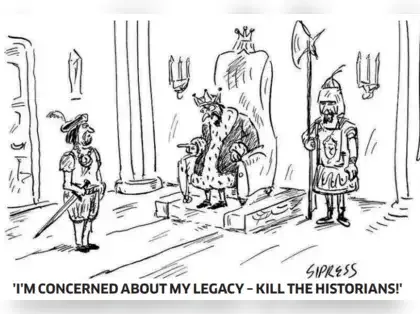Very few things happen at the right time, and the rest do not happen at all: the conscientious historian will correct these defects.
- Herodotus, according to Mark Twain, A Horse's Tale (1907)
'History is more or less bunk... and I wouldn't give a nickel for it,' famously remarked history-making automobile tycoon Henry Ford, whose Model T 'Tin Lizzie' could be had by customers in any colour 'so long as it is black'.
According to a recent report, students of nine schools in the north-eastern Australian state of Queensland would heartily endorse the American motor magnate's black mark against that out-of-date, has-been called history, after it was discovered--just before they were to sit for an exam on the subject--that their teachers had been teaching them about the wrong Caesar: Augustus instead of his predecessor Julius, as prescribed by the curriculum.
The error, which led to the hasty cancellation of the exam, much to the relief of the mistaught students, made local media headlines bemoaning the decline and faux pas of the Roman Empire. The minister for education who is investigating how the gaffe could have taken place said that the experience must have been 'extremely traumatic' for the students.
Regrettable as it is, the historical mix-up is understandable, as in the Caesar salad bowl of antiquity, there are no fewer than 12 rulers bearing that same nominal suffix, their order of appearance being Julius, Augustus, Tiberius Caligula, Claudius, Nero, Galba, Otho, Vitellius, Vespasian, Titus, and Domitian. (Now you know.)
Perhaps, having had a prophetic vision of such bloomers, Hegel developed his concept of 'The end of history', an augury which didn't imply Doomsday, but was the outcome of the World Spirit which through the dialectical process of thesis and antithesis would culminate in a utopian state of perfect rationality and freedom.
Marx, who remarked that history repeats itself, first as tragedy and then as farce, claimed that he had found fellow philo Hegel standing on his head and put him the right way up by formulating his own version of dialectical materialism, based on the collective ownership of the means of production, which would bring about the perfectly egalitarian society of communism and free humankind from the repressive narrative of class struggle that we call history.
A century and a half later Francis Fukuyama paid Marx back in his own upside-down coin by flipping communism over in his 1992 book of political philosophy, The End of History and the Last Man, and argued that with the dissolution of the Soviet Union and the termination of the Cold War, liberal democracy was the unopposed protagonist in a world without ideological conflict, which comprised the twists and turns of the labyrinth of historical narrative.
A bare four years later, Samuel P Huntington's Clash of Civilisations and the Remaking of World Order predicated that the post-Cold War world would be a continuously embattled chronicle between opposing religious beliefs and cultural norms.
'Those who don't read history are doomed to repeat it' is an aphorism attributed to George Santayana, implying that societies and individuals, who don't learn from their past mistakes are destined to keep on making the same errors repeatedly. Perhaps the Spanish philosopher had in mind those who have recurringly fallen into the trap of variously putting paid to history, only to have history put paid to them. Such foreseen reiteration might have prompted Alexis de Tocqueville's description of history in his 1856 work, The Old Regime and the Revolution, as 'a picture gallery containing a host of copies and very few originals'.
History can be a wily villain of the piece, as observed in the 1964 Britcom, 'Carry On Cleao,' in which an anguished Julius Caesar, who in Australian classrooms was so summarily deposed by Augustus, cries out, 'Infamy, infamy! They've all got it in fer me!'
- Herodotus, according to Mark Twain, A Horse's Tale (1907)
'History is more or less bunk... and I wouldn't give a nickel for it,' famously remarked history-making automobile tycoon Henry Ford, whose Model T 'Tin Lizzie' could be had by customers in any colour 'so long as it is black'.
According to a recent report, students of nine schools in the north-eastern Australian state of Queensland would heartily endorse the American motor magnate's black mark against that out-of-date, has-been called history, after it was discovered--just before they were to sit for an exam on the subject--that their teachers had been teaching them about the wrong Caesar: Augustus instead of his predecessor Julius, as prescribed by the curriculum.
The error, which led to the hasty cancellation of the exam, much to the relief of the mistaught students, made local media headlines bemoaning the decline and faux pas of the Roman Empire. The minister for education who is investigating how the gaffe could have taken place said that the experience must have been 'extremely traumatic' for the students.
Regrettable as it is, the historical mix-up is understandable, as in the Caesar salad bowl of antiquity, there are no fewer than 12 rulers bearing that same nominal suffix, their order of appearance being Julius, Augustus, Tiberius Caligula, Claudius, Nero, Galba, Otho, Vitellius, Vespasian, Titus, and Domitian. (Now you know.)
Perhaps, having had a prophetic vision of such bloomers, Hegel developed his concept of 'The end of history', an augury which didn't imply Doomsday, but was the outcome of the World Spirit which through the dialectical process of thesis and antithesis would culminate in a utopian state of perfect rationality and freedom.
Marx, who remarked that history repeats itself, first as tragedy and then as farce, claimed that he had found fellow philo Hegel standing on his head and put him the right way up by formulating his own version of dialectical materialism, based on the collective ownership of the means of production, which would bring about the perfectly egalitarian society of communism and free humankind from the repressive narrative of class struggle that we call history.
A century and a half later Francis Fukuyama paid Marx back in his own upside-down coin by flipping communism over in his 1992 book of political philosophy, The End of History and the Last Man, and argued that with the dissolution of the Soviet Union and the termination of the Cold War, liberal democracy was the unopposed protagonist in a world without ideological conflict, which comprised the twists and turns of the labyrinth of historical narrative.
A bare four years later, Samuel P Huntington's Clash of Civilisations and the Remaking of World Order predicated that the post-Cold War world would be a continuously embattled chronicle between opposing religious beliefs and cultural norms.
'Those who don't read history are doomed to repeat it' is an aphorism attributed to George Santayana, implying that societies and individuals, who don't learn from their past mistakes are destined to keep on making the same errors repeatedly. Perhaps the Spanish philosopher had in mind those who have recurringly fallen into the trap of variously putting paid to history, only to have history put paid to them. Such foreseen reiteration might have prompted Alexis de Tocqueville's description of history in his 1856 work, The Old Regime and the Revolution, as 'a picture gallery containing a host of copies and very few originals'.
History can be a wily villain of the piece, as observed in the 1964 Britcom, 'Carry On Cleao,' in which an anguished Julius Caesar, who in Australian classrooms was so summarily deposed by Augustus, cries out, 'Infamy, infamy! They've all got it in fer me!'
(Disclaimer: The opinions expressed in this column are that of the writer. The facts and opinions expressed here do not reflect the views of www.economictimes.com.)









Jug Suraiya
A prominent Indian journalist, author and columnist.